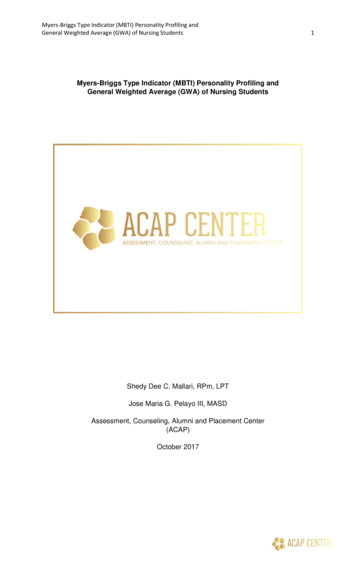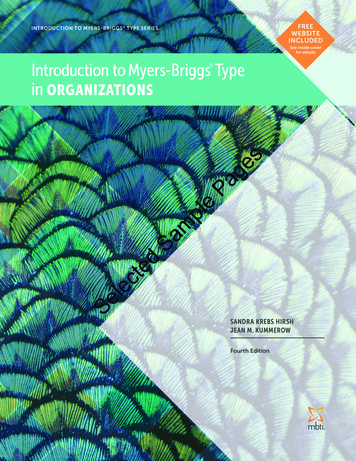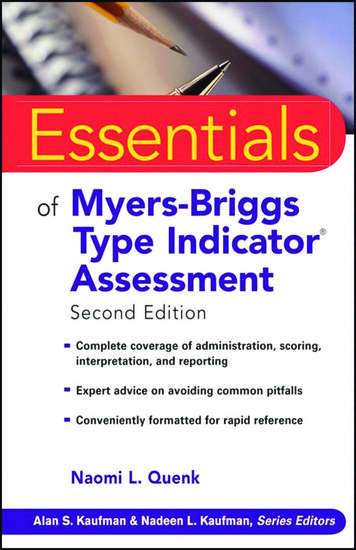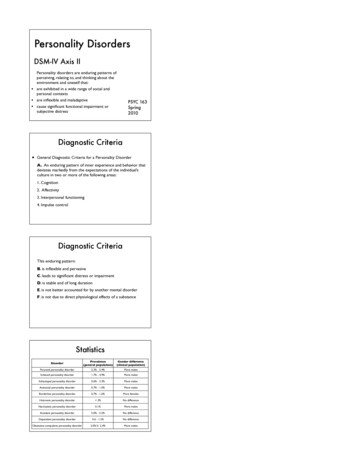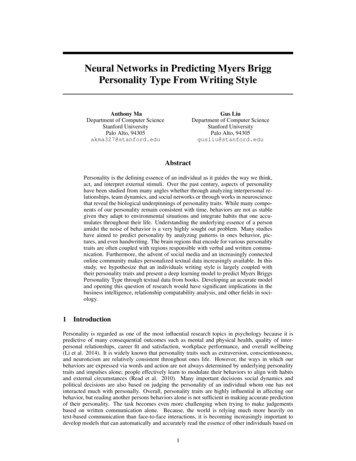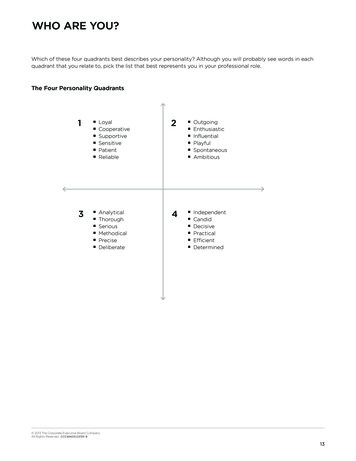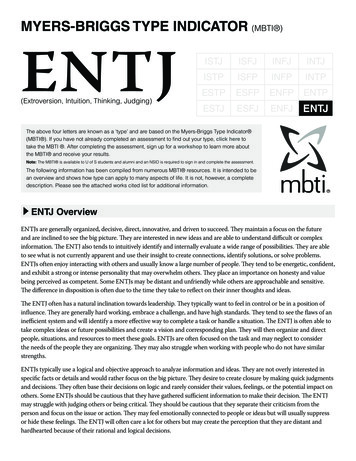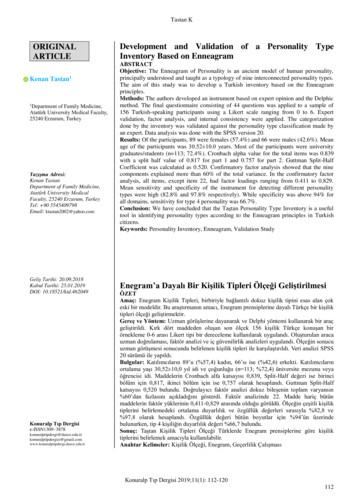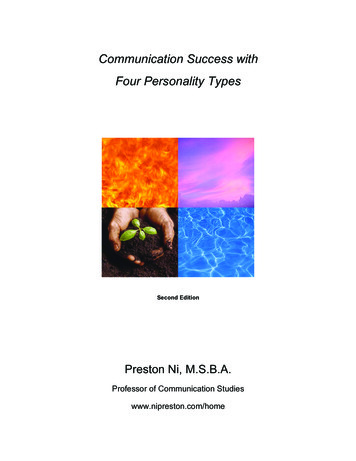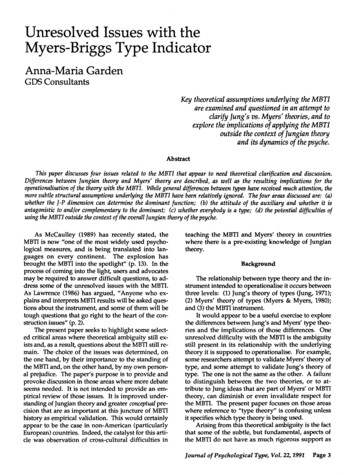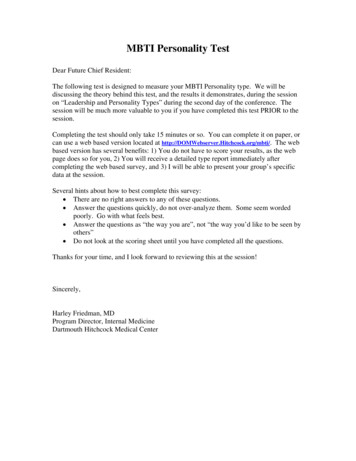
Transcription
MBTI Personality TestDear Future Chief Resident:The following test is designed to measure your MBTI Personality type. We will bediscussing the theory behind this test, and the results it demonstrates, during the sessionon “Leadership and Personality Types” during the second day of the conference. Thesession will be much more valuable to you if you have completed this test PRIOR to thesession.Completing the test should only take 15 minutes or so. You can complete it on paper, orcan use a web based version located at http://DOMWebserver.Hitchcock.org/mbti/. The webbased version has several benefits: 1) You do not have to score your results, as the webpage does so for you, 2) You will receive a detailed type report immediately aftercompleting the web based survey, and 3) I will be able to present your group’s specificdata at the session.Several hints about how to best complete this survey: There are no right answers to any of these questions. Answer the questions quickly, do not over-analyze them. Some seem wordedpoorly. Go with what feels best. Answer the questions as “the way you are”, not “the way you’d like to be seen byothers” Do not look at the scoring sheet until you have completed all the questions.Thanks for your time, and I look forward to reviewing this at the session!Sincerely,Harley Friedman, MDProgram Director, Internal MedicineDartmouth Hitchcock Medical Center
MBTI Personality Type Test1.At a party do you:a. Interact with many, including strangersb. Interact with a few, known to you14. Does it bother you more having things:a. Incompleteb. Completed2.Are you more:a. Realistic than speculativeb. Speculative than realistic15. In your social groups do you:a. Keep abreast of other’s happeningsb. Get behind on the news3.Is it worse to:a. Have your “head in the clouds”b. Be “in a rut”16. In doing ordinary things are you morelikely to:a. Do it the usual wayb. Do it your own way4.Are you more impressed by:a. Principlesb. Emotions5.6.7.8.9.Are more drawn toward the:a. Convincingb. TouchingDo you prefer to work:a. To deadlinesb. Just “whenever”Do you tend to choose:a. Rather carefullyb. Somewhat impulsivelyAt parties do you:a. Stay late, with increasing energyb. Leave early with decreased energyAre you more attracted to:a. Sensible peopleb. Imaginative people10. Are you more interested in:a. What is actualb. What is possible11. In judging others are you more swayedby:a. Laws than circumstancesb. Circumstances than laws17. Writers should:a. “Say what they mean and mean what theysay”b. Express things more by use of analogy18. Which appeals to you more:a. Consistency of thoughtb. Harmonious human relationships19. Are you more comfortable in making:a. Logical judgmentsb. Value judgments20. Do you want things:a. Settled and decidedb. Unsettled and undecided21. Would you say you are more:a. Serious and determinedb. Easy-going22. In phoning do you:a. Rarely question that it will all be saidb. Rehearse what you’ll say23. Facts:a. “Speak for themselves”b. Illustrate principles24. Are visionaries:a. somewhat annoyingb. rather fascinating12. In approaching others is your inclinationto be somewhat:a. Objectiveb. Personal25. Are you more often:a. a cool-headed personb. a warm-hearted person13. Are you more:a. Punctualb. Leisurely26. Is it worse to be:a. unjustb. merciless
27. Should one usually let events occur:a. by careful selection and choiceb. randomly and by chance28. Do you feel better about:a. having purchasedb. having the option to buy29. In company do you:a. initiate conversationb. wait to be approached30. Common sense is:a. rarely questionableb. frequently questionable31. Children often do not:a. make themselves useful enoughb. exercise their fantasy enough32. In making decisions do you feel morecomfortable with:a. standardsb. feelings33. Are you more:a. firm than gentleb. gentle than firm34. Which is more admirable:a. the ability to organize and be methodicalb. the ability to adapt and make do35. Do you put more value on:a. infiniteb. open-minded36. Does new and non-routine interactionwith others:a. stimulate and energize youb. tax your reserves37. Are you more frequently:a. a practical sort of personb. a fanciful sort of person38. Are you more likely to:a. see how others are usefulb. see how others see39. Which is more satisfying:a. to discuss an issue thoroughlyb. to arrive at agreement on an issue40. Which rules you more:a. your headb. your heart41. Are you more comfortable with work thatis:a. contractedb. done on a casual basis42. Do you tend to look for:a. the orderlyb. whatever turns up43. Do you prefer:a. many friends with brief contactb. a few friends with more lengthy contact44. Do you go more by:a. factsb. principles45. Are you more interested in:a. production and distributionb. design and research46. Which is more of a compliment:a. “There is a very logical person.”b. “There is a very sentimental person.”47. Do you value in yourself more that youare:a. unwaveringb. devoted48. Do you more often prefer thea. final and unalterable statementb. tentative and preliminary statement49. Are you more comfortable:a. after a decisionb. before a decision50. Do you:a. speak easily and at length with strangersb. find little to say to strangers51. Are you more likely to trust your:a. experienceb. hunch52. Do you feel:a. more practical than ingeniousb. more ingenious than practical53. Which person is more to be complimented– one of:a. clear reasonb. strong feeling
54. Are you inclined more to be:a. fair-mindedb. sympathetic63. Are you a person that is more:a. routinized than whimsicalb. whimsical than routinized55. Is it preferable mostly to:a. make sure things are arrangedb. just let things happen64. Are you more inclined to be:a. easy to approachb. somewhat reserved56. In relationships should most things be:a. re-negotiableb. random and circumstantial65. In writings do you prefer:a. the more literalb. the more figurative57. When the phone rings do you:a. hasten to get to it firstb. hope someone else will answer66. Is it harder for you to:a. identify with othersb. utilize others58. Do you prize more in yourself:a. a strong sense of realityb. a vivid imagination67. Which do you wish more for yourself:a. clarity of reasonb. strength of compassion59. Are you drawn more to:a. fundamentalsb. overtones68. Which is the greater fault:a. being indiscriminateb. being critical60. Which seems the greater error:a. to be too passionateb. to be too objective69. Do you prefer the:a. planned eventb. unplanned event61. Do you see yourself as basically:a. hard-headedb. soft-hearted70. Do you tend to be more:a. deliberate than spontaneousb. spontaneous than deliberate62. Which situation appeals to you more:a. the structured and scheduledb. the unstructured and unscheduled
ScoringCol 1A B181522293643505764Col 2A B291623303744515865Col 3A B31017243138455259664111825323946536067Copy to ÆE1.2.3.4.5.ICol 4A BCol 5A B51219263340475461686132027344148556269Copy to ÆSNCol 6A BCol 7A B7142128354249566370Copy to ÆTFCopy your answers to this answer key carefully.Count the number of checks in each of the A and B columns, and total at the bottom.Copy the totals for Column 2 to the spaces below the totals for Column 3. Do the same forColumns 4 and 6.Add totals downwards to calculate your totals.Circle the letter with this highest score. This is your type.JP
Portrait of an ENFJ - Extraverted iNtuitive Feeling Judging(Extraverted Feeling with Introverted Intuition)The GiverAs an ENFJ, you're primary mode of living is focused externally, where you deal with things according tohow you feel about them, or how they fit into your personal value system. Your secondary mode is internal,where you take things in primarily via your intuition.ENFJs are people-focused individuals. They live in the world of people possibilities. More so than anyother type, they have excellent people skills. They understand and care about people, and have a specialtalent for bringing out the best in others. ENFJ's main interest in life is giving love, support, and a goodtime to other people. They are focused on understanding, supporting, and encouraging others. They makethings happen for people, and get their best personal satisfaction from this.Because ENFJ's people skills are so extraordinary, they have the ability to make people do exactly whatthey want them to do. They get under people's skins and get the reactions that they are seeking. ENFJ'smotives are usually unselfish, but ENFJs who have developed less than ideally have been known to usetheir power over people to manipulate them.ENFJ's are so externally focused that it's especially important for them to spend time alone. This can bedifficult for some ENFJs, because they have the tendency to be hard on themselves and turn to darkthoughts when alone. Consequently, ENFJs might avoid being alone, and fill their lives with activitiesinvolving other people. ENFJs tend to define their life's direction and priorities according to other people'sneeds, and may not be aware of their own needs. It's natural to their personality type that they will tend toplace other people's needs above their own, but they need to stay aware of their own needs so that theydon't sacrifice themselves in their drive to help others.ENFJ's tend to be more reserved about exposing themselves than other extraverted types. Although theymay have strongly-felt beliefs, they're likely to refrain from expressing them if doing so would interferewith bringing out the best in others. Because their strongest interest lies in being a catalyst of change inother people, they're likely to interact with others on their own level, in a chameleon-like manner, ratherthan as individuals.ENFJs have definite values and opinions which they're able to express clearly and succinctly. These beliefswill be expressed as long as they're not too personal. ENFJ is in many ways expressive and open, but ismore focused on being responsive and supportive of others. When faced with a conflict between a stronglyheld value and serving another person's need, they are highly likely to value the other person's needs.The ENFJ may feel quite lonely even when surrounded by people. This feeling of aloneness may beexacerbated by the tendency to not reveal their true selves.People love ENFJs. They are fun to be with, and truly understand and love people. They are typically verystraight-forward and honest. Usually ENFJs exude a lot of self-confidence, and have a great amount ofability to do many different things. They are generally bright, full of potential, energetic and fast-paced.They are usually good at anything which captures their interest.ENFJs like for things to be well-organized, and will work hard at maintaining structure and resolvingambiguity. They have a tendency to be fussy, especially with their home environments.In the work place, ENFJs do well in positions where they deal with people. They are naturals for the socialcommittee. Their uncanny ability to understand people and say just what needs to be said to make themhappy makes them naturals for counseling. They enjoy being the center of attention, and do very well insituations where they can inspire and lead others, such as teaching.
ENFJs do not like dealing with impersonal reasoning. They don't understand or appreciate its merit, andwill be unhappy in situations where they're forced to deal with logic and facts without any connection to ahuman element. Living in the world of people possibilities, they enjoy their plans more than theirachievements. They get excited about possibilities for the future, but may become easily bored and restlesswith the present.ENFJs have a special gift with people, and are basically happy people when they can use that gift to helpothers. They get their best satisfaction from serving others. Their genuine interest in Humankind and theirexceptional intuitive awareness of people makes them able to draw out even the most reserved individuals.ENFJs have a strong need for close, intimate relationships, and will put forth a lot of effort in creating andmaintaining these relationships. They're very loyal and trustworthy once involved in a relationship.An ENFJ who has not developed their Feeling side may have difficulty making good decisions, and mayrely heavily on other people in decision-making processes. If they have not developed their Intuition, theymay not be able to see possibilities, and will judge things too quickly based on established value systems orsocial rules, without really understanding the current situation. An ENFJ who has not found their place inthe world is likely to be extremely sensitive to criticism, and to have the tendency to worry excessively andfeel guilty. They are also likely to be very manipulative and controlling with others.In general, ENFJs are charming, warm, gracious, creative and diverse individuals with richly developedinsights into what makes other people tick. This special ability to see growth potential in others combinedwith a genuine drive to help people makes the ENFJ a truly valued individual. As giving and caring as theENFJ is, they need to remember to value their own needs as well as the needs of others.Jungian functional preference ordering:Dominant: Extraverted FeelingAuxiliary: Introverted IntuitionTertiary: Extraverted SensingInferior: Introverted ThinkingENFJs generally have the following traits:Genuinely and warmly interested in peopleValue people's feelingsValue structure and organizationValue harmony, and good at creating itExceptionally good people skillsDislike impersonal logic and analysisStrong organizational capabilitiesLoyal and honestCreative and imaginativeEnjoy variety and new challengesGet personal satisfaction from helping othersExtremely sensitive to criticism and discordNeed approval from others to feel good about themselvesENFJ RelationshipsENFJs put a lot of effort and enthusiasm into their relationships. To some extent, the ENFJ definesthemselves by the closeness and authenticity of their personal relationships, and are therefore highlyinvested in the business of relationships. They have very good people skills, and are affectionate andconsiderate. They are warmly affirming and nurturing. They excel at bringing out the best in others, andwarmly supporting them. They want responding affirmation from their relationships, although they have aproblem asking for it. When a situation calls for it, the ENFJ will become very sharp and critical. Afterhaving made their point, they will return to their natural, warm selves. They may have a tendency to"smother" their loved ones, but are generally highly valued for their genuine warmth and caring natures.
Most ENFJs will exhibit the following strengths with regards to relationship issues:Good verbal communication skillsVery perceptive about people's thoughts and motivesMotivational, inspirational; bring out the best in othersWarmly affectionate and affirmingFun to be with - lively sense of humor, dramatic, energetic, optimisticGood money skillsAble to "move on" after a love relationship has failed (although they blame themselves)Loyal and committed - they want lifelong relationshipsStrive for "win-win" situationsDriven to meet other's needsMost ENFJs will exhibit the following weaknesses with regards to relationships issues:Tendency to be smothering and over-protectiveTendency to be controlling and/or manipulativeDon't pay enough attention to their own needsTend to be critical of opinions and attitudes which don't match their ownSometimes unaware of social appropriateness or protocolExtremely sensitive to conflict, with a tendency to sweep things under the rug as an avoidancetacticTendency to blame themselves when things go wrong, and not give themselves credit when thingsgo rightTheir sharply defined value systems make them unbending in some areasThey may be so attuned to what is socially accepted or expected that they're unable to assesswhether something is "right" or "wrong" outside of what their social circle expects.What does Success mean to an ENFJ?ENFJs are motivated by external human situations, primarily by other people; their talents, their needs,their aspirations and their cares forming the world in which an ENFJ lives. They thrive when able to “makethings right” for others, to enable and empower their co-workers, friends and family through valuing theirhuman strengths and abilities. When gifted with the added ENFJ ability to intuitively adapt their feelings tothe way they are affected by others, the ENFJ has a positive drive to find co-operative pathways leading tothe best possible outcome for all. Success for an ENFJ comes through involvement in the process ofmaking things happen for people; through the accomplishments and satisfactions of those they have helpedto enrich the human world with greater value, and through finding that their efforts on behalf of others havefulfilled their own life as well.Allowing Your ENFJ Strengths to FlourishAs an ENFJ, you have gifts that are specific to your personality type that aren't natural strengths for othertypes. By recognizing your special gifts and encouraging their growth and development, you will morereadily see your place in the world, and be more content with your role.Nearly all ENFJs will recognize the following characteristics in themselves. They should embrace andnourish these strengths:Making others feel valued and importantQuickly seeing the positive and negative aspects of a human situationExpressing their feelings clearlyOffering loyalty and commitment to partners, family and work matesTrying to always find the solution which works for everyoneEncouraging humor and self expression in othersFinding ways to help others fulfill their needsAffirming positive community valuesNaturally falling into leadership roles in their community
ENFJs who have developed their Introverted Intuition to the extent that they can see the possibilities withintheir perceptions will enjoy these very special gifts:Understanding and empathizing with the feelings of others; realizing “where they are comingfrom”.A talent for creative expression which can turn ordinary things and situations into somethingmagical.An enhanced feeling of connection with and sensitivity to the world around them.The ability to see many facets of a problem and the many ways it might be resolved for the best.The ability to make creative and valuable use of time spent alone.Openness to the spiritual connections between all thingsThey become increasingly creative, visionary and empathetic, and are therefore effective and kindmanagers of businesses, people, and various situations that life presents.Potential Problem AreasWith any gift of strength, there is an associated weakness. Without "bad", there would be no "good".Without "difficult", there would be no "easy". We value our strengths, but we often curse and ignore ourweaknesses. To grow as a person and get what we want out of life, we must not only capitalize upon ourstrengths, but also face our weaknesses and deal with them. That means taking a hard look at ourpersonality type's potential problem areas.Most of the weaker characteristics found in ENFJs are due to their dominant Extraverted Feelingovervaluing what they see as objective values in the external world and thereby judging too much by theneeds of others, or by appearances. This is primarily due to the ENFJ having not fully adapted theirIntroverted Intuitive function sufficiently for them to be able to discern the vast range of ways in whichthey might be being missing the underlying needs within themselves and being misled by suchappearances. The ENFJ naturally looks outward to find value and satisfaction, and whilst it is essential thatthis direction be taken to fulfill their primary needs of relation and comfort, without the supportive balanceof a well developed Intuitive function, ENFJs can overvalue the external world to the point where they losesight of themselves, becoming fixed in their judgments about people and the world. In such cases, theENFJ will tend to live in a rigid - and to others, somewhat surreal - world of definite values which oftenseems “overstated” or obsessively connected to other people or human situations.Explanation of ProblemsNearly all of the problematic characteristics described above can be attributed in various degrees to thecommon ENFJ problem of wanting to find the “proper” value in everything. If the ENFJ does not learnhow to see beneath the appearance of what they quickly judge as good or bad about the people andsituations in their external environment, they will only use their introverted intuition to support thosejudgments they feel are good for them and disregard not only other possibilities but their own quality ofinner life as well. The consideration of these less obvious possibilities and their own needs requires that theENFJ recognize that their own value judgments are indeed subjective, and that it is not appropriate oreffective to apply them across the board to all civilized people. The practice of standing back and lookingobjectively at their own value system is not something that the ENFJ is accustomed to doing; trying toavoid abstract rationalization of problems and the feelings they engender is a natural survival technique forthe ENFJ personality. The main driver to the ENFJ personality is Extraverted Feeling, whose purpose isabove all to find and discriminate the values in people and human situations. If their ability to find aspecific and worthy value in a person or situation is threatened, the ENFJ shuts out the threatening force.This is totally natural, but unfortunately the individual who exercises this type of agenda protectionregularly will become more and more rigid in their judgments and expectations of people, but even lessconcerned with the effect such conditions have upon themselves. Where the unbalanced ENFJ doesacquiesce to the images of intuition, these will generally be skewed to support the subjective agenda ofdominant Feeling. In this way they always find justification for their determinations and their selfsacrifices to people, things and situations, and they will be unable locate the reality of another’s true
feelings, nor be interested in discovering that their seemingly objective judgments miss the reasons andsubjectivities underlying both their own and others lives or worldly situation.Petulance, pensiveness and a sense of being let down by others can often be the end result of this one sidedapproach to the world, whilst if the ENFJ is in a strong company or relationship position they mightbecome driven to manipulate others and situations to conform to their own feeling needs and valuejudgments, irrespective of any true value to the situation or for the other persons involved. In this case, the“big picture” valued for its great worth to all, becomes a dominant drive which seeks to blot out or crushany opposition by claiming the moral high ground, even to the point where the ENFJ sacrifices their ownlife to the “cause”. The inability to recognize the plethora of subjective possibilities their feelings bring intotheir lives strip the unbalanced ENFJ of their access to both a deeper connection with others and thepossibility of refining and developing pathways to the kind of self understanding and self nurturing theirfiner judgments might otherwise lead them to.SolutionsTo grow as an individual, the ENFJ needs to focus on paying attention to their inner images. This meansthey need to be open to the possibilities that lie beneath their judgments and values, rather than justaccepting the appearance of values which accord with their sense of rightness. The ENFJ needs tounderstand that developing their ability to see the subjective possibilities within themselves and others doesnot threaten their ability to make correct judgments, but rather enhances it, and enhances their personalchances for achieving a measure of success in their lives.The ENFJ concerned with personal growth will pay close attention to their motivation for accepting valuesthat come to them. Are they trying to see the background of circumstance behind their own and othersvalue judgments, or are they trying to maintain their own image of how things “ought” to be? The goal is tofind a balance between what seems correct and valuable and the many possible ways in which such ajudgment might be subjective and not necessarily the best for themselves or a situation. Obviously, this isnot entirely possible, but it is the exercise to keep in mind. They need to see the many divergent images ofvalues and their conflicts which affect them, without feeling threatened, and without losing their sense ofwhat is right and wrong.Living Happily in our World as an ENFJAs can be seen from the above, some strongly expressed ENFJs can have difficulty fitting into society.Their problems are usually due to their Extraverted Feeling function being so dominant that they are sostrongly bound to what they see as objective values that they cannot relate to the world except via theobjects of their feeling. In such cases the intensity of their judgments can actually drive others away fromthem, and the resulting lack of close relationship felt as a personal failing for which the ENFJ feels guilty.Such guilt can drive even more strongly affective behavior which leads the ENFJ to ignore their own needsentirely, or it can become a negative drive to manipulate others to conform to their one-sided vision of theworld. The ENFJ who consistently tries to see the underlying possibilities and the scope available in eachsituation will be able to see the right path to take with each person and situation in their life. This willalways lead them to toward closer relationships, happiness and great achievements.The key to personal growth for the ENFJ is competent execution of Introverted Intuition. Because it isoften hard to define what this represents subjectively to each person, here are some action-orientedsuggestions that will help lead you down the path towards more effective use of the Introverted Intuitivefunction.Specific suggestions:When confronted by a person or situation which seems to be rejecting or rebuffing your value judgmentsand your mind filling with all the arguments, images and alternatives to the situation, look closely at thoseyou are immediately rejecting as negative or unsuitable ways to proceed. Within these images often liepaths to understanding and agreement if you look more closely. Some of these images hold the key toseeing another’s feelings and point of view more clearly. Remember, what seems positive to you may notbe everything or even important to another.
Behind everything of value that you see lies much potential. Try not to be satisfied with just a good result,but let yourself imagine the ways in which a person might fulfill all their creative aspects; the ways inwhich a situation might become useful to many more than just what it was made for. Try to imagineeverything as a source of untapped magic and creative power – let your mind see all the things it mightbecome. Above all, apply this exercise to yourself, as if you were seeing yourself in a mirror: just as youwould another person whom you love.When you are alone try to become fully aware of how it feels to you, try to recognize the emptiness as aplace of potential, try to imagine what you might be able to do for others in this empty time, try to realizethat you are not truly alone but with this special person who is yourself. What would you do for this personif you could make their private world a better place?Everything wonderful in life proceeds from the qualities which lie behind it. You can feel these things,these drives and attitudes which seem to come from a place outside, perhaps from the creator expressinghimself within people and nature. Letting the sense of these background qualities permeate your drive tolife will give you purpose and meaning. Allow yourself to feel the meanings and purposes of the world, letthem become a valuable gift which can be expressed in your dealings with others and in the things youstrive for.Ten Rules to Live By to Achieve ENFJ Success1.Feed Your Strengths! Make sure you have opportunities to involve yourself with others insituations where your input is valued.2. Face Your Weaknesses! Realize and accept that some traits are strengths and some areweaknesses. By facing your weaknesses, you can overcome them and they will have less powerover you.3. Express Your Feelings. Understand that your feelings are as important as others are in the overallsituation. Without your feelings and needs being valued the best result is not realized, so value andspeak to your own feelings as much as you value those of others.4. Make Decisions. Don't be afraid to have an opinion. You need to know show others the qualitiesand potentials you can see are worthy of action.5. Smile at Criticism. Try to see why disagreement and discord indicate the differences betweenpeople, and use this as an opportunity to make your value judgments useful for growth, becausethat's exactly what they are. Try not to feel responsible for another’s criticism, but try to hear itand understand the feelings and images it engenders within you. Then you may see a path not onlyto agreement but to a shared and truly valuable end.6. Be Aware of Others. Remember that there are 15 other personality types out there who see thingsdifferently than you see them. Most of your problems with other people are easier to deal with ifyou try to understand the other person's perspective.7. Be Aware of Yourself. Don't stint your own needs for the sake of others too much. Realize you arean important focus. If you do not fulfill your own needs, how will continue to be effective andhow will others know you are true to your beliefs?8. Be Gentle in Your Expectations. It is easy for you to see the value in
MBTI Personality Test Dear Future Chief Resident: The following test is designed to measure your MBTI Personality type. We will be discussing the theory behind this test, and the results it demonstrates, during the session on “Leadership and Personality
